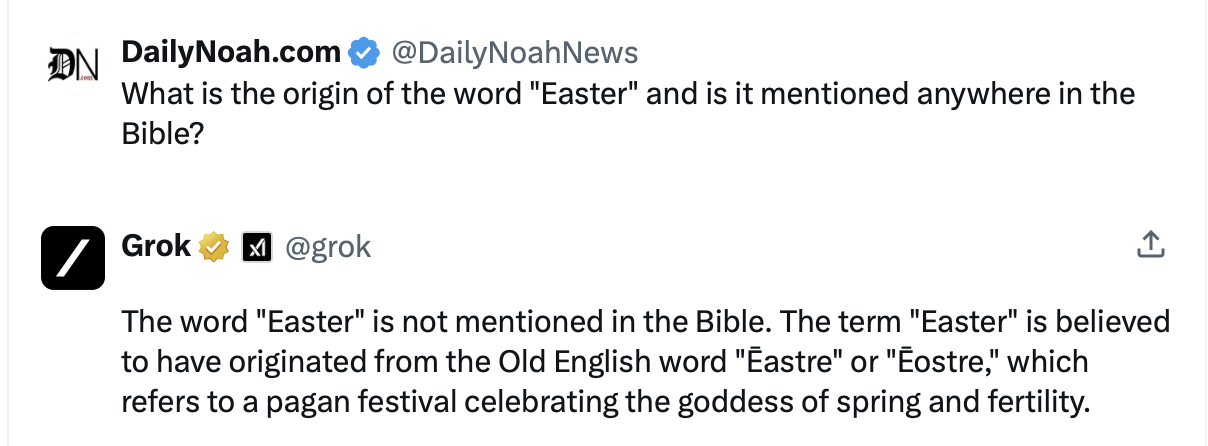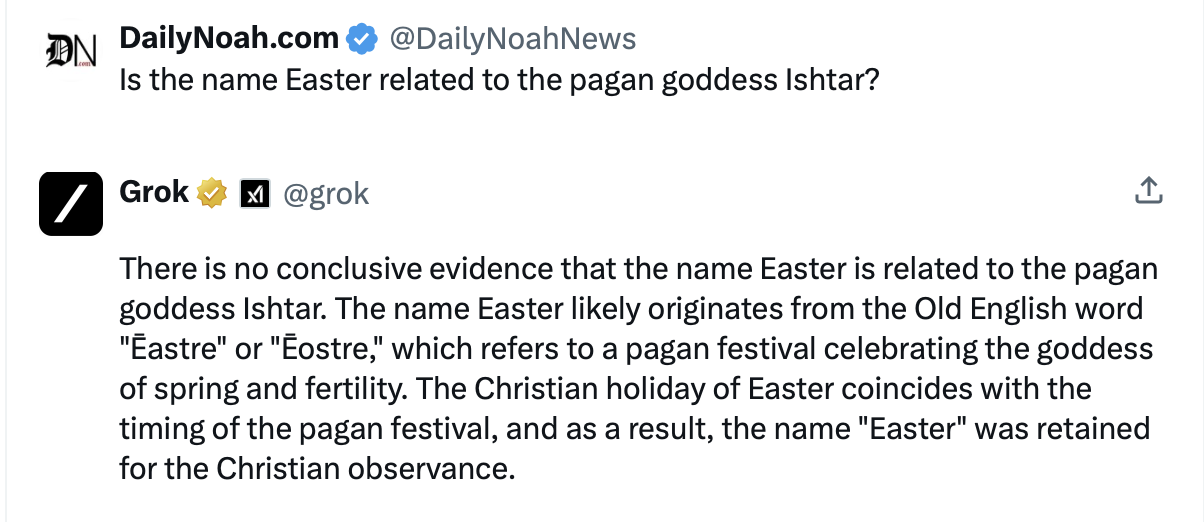Ok, let’s address this…
In almost 10 years of running this website, I don’t think I’ve ever tackled this topic.
But now it’s time.
And what I’m about to say might surprise you….in several different ways depending on what you already know about this topic or where you personally fall in your feelings about it.
So make sure you read to the end to get my FULL opinion!
But here’s the basic premise that we’re going to tackle: the Bible never talks about “Easter”. Easter is in fact derived from the pagan fertility “goddess” Ishtar, which is the reason for the eggs and bunny, because those are also fertility symbols.
Some of you are saying “it’s about time Noah finally covered this!”
Others of you are saying “there’s no way that can be true.”
Yet another group is saying “I don’t care if it’s true, just don’t ruin my adult version of the Easter Bunny and Santa Claus please!”
So, big question: is it true?
After we answer that we’ll talk about what to do about it.
Here’s what my friend Bo Polny just posted:
HAPPY EASTER????
Have you been LIED too????Think TWISE before saying ‘Happy Easter’ this RESURRECTION Sunday!!!
Ishtar: pronounced ‘Easter’
‘Easter’ was originally the celebration of the god Ishtar, the Assyrian and Babylonian goddess of fertility, animal sacrifices,…
— Bo Polny (@BoPolny) March 29, 2024
So I’ll just cut right to the chase: Yes, by all accounts this is historically true. Most of it. I’ll explain more down below…
Here is Grok telling you point blank that the eggs and bunnies related to Easter trace back to “ancient pagan traditions and fertility symbols”:

Sorry folks, I don’t make the news, I just report it.
Now to the name “Easter”….
There appears to be some conflict on this topic.
Grok reports that the name does indeed drive from a pagan fertility festival, but that is “Ēastre” or “Ēostre,” not specifically “Ishtar”:

If find “Ēostre,” interesting in how closely related it is to the word “esoteric”.
But as to “Ishtar”, Grok reports there is not a direct connection there:

Now let’s go to ChatGPT to see what it says about Easter, the Eggs and the Bunny:
So once again we confirm that the bunny and the eggs are tied to pagan fertility rituals, and later co-opted into Christianity.
They try to tie the tomb of Jesus to breaking out of the egg and “new life” to fertility rituals.
Ok, so now the big question: what do we do with all of this?
The Bible tells us to celebrate 7 main feast days:
- Passover (Pesach): Commemorates the Israelites’ deliverance from Egyptian slavery, when the angel of death “passed over” the houses of the Israelites marked with the blood of a lamb, sparing their firstborn sons (Exodus 12:1-14).
- Feast of Unleavened Bread (Chag HaMatzot): Observed immediately after Passover, this seven-day festival involves the removal of all leaven (yeast) from homes to symbolize purity and separation from sin (Exodus 12:15-20).
- Feast of Firstfruits (Yom HaBikkurim): Celebrated on the day after the Sabbath following Passover, it involves presenting the first sheaf of the barley harvest to the Lord as an offering, acknowledging God’s provision (Leviticus 23:10-14).
- Feast of Weeks or Pentecost (Shavuot): Occurring fifty days after the Feast of Firstfruits, it marks the end of the barley harvest and the beginning of the wheat harvest. It also commemorates the giving of the Torah to Moses at Mount Sinai (Leviticus 23:15-22).
- Feast of Trumpets (Rosh Hashanah): This is a day of rest marked by blowing trumpets, signaling the beginning of the ten days of repentance leading up to the Day of Atonement (Leviticus 23:23-25).
- Day of Atonement (Yom Kippur): Considered the holiest day of the Jewish year, it involves fasting and repentance. The high priest enters the Holy of Holies to make atonement for the sins of the people (Leviticus 16; Leviticus 23:26-32).
- Feast of Tabernacles or Booths (Sukkot): A week-long festival during which Israelites live in temporary shelters (booths) to commemorate their wilderness journey and dependence on God’s provision. It also celebrates the harvest (Leviticus 23:33-43).
I don’t see anywhere in the Bible where we are told to stop celebrating these.
In fact, they seem to be very important.
And no part of the Bible describes celebrating with Eggs and Bunnies.
But it’s also true that there is a long history of Christians and Christianity shining light on darkness, bringing the TRUTH to places that were previously living in pagan confusion.
It appears historically accurate that while the ancient origins of “Easter” and the bunny and the eggs were steeped deeply in pagan fertility rituals, Christians came in and took that over, replacing pagan rituals with Christian truth.
And I don’t think that’s a bad thing.
In fact, it reminds me of Paul when he arrives in Athens.
Do you know this story?
It’s from Acts 17:23, which says:
“For as I passed by, and beheld your devotions, I found an altar with this inscription, TO THE UNKNOWN GOD. Whom therefore ye ignorantly worship, him declare I unto you.”
So you have Paul heading into the most pagan place he could find, Athens, full of monuments to dozens or hundreds of pagan “gods”.
What does Paul do?
Does he say I can’t come to your city?
Does he say I can’t talk to you, can’t be around you, can’t engage with you?
No.
He goes straight into the darkness and finds a way to relate to what they are doing, and uses that as a bridge to introduce them to the one true God.
And that’s what Christians have done historically in many contexts, but especially here.
They took a pagan fertility ritual and commandeered it to instead proclaim the truth of Jesus and his resurrection.
So back to the big question: what are we to do with this information?
Some people go as far as to say they’re not celebrating “Easter” at all.
They skip church, skip the whole thing, and pretend like it’s not happening.
That doesn’t feel right to me and I’m not advocating for that.
I think there’s a balance to be struck here….
Failing to celebrate Jesus’ resurrection just because it has the name “Easter” or some people use bunnies and eggs feels like the wrong outcome to me.
I think we do what the Church has always historically done.
I think we continue to shine light into the darkness….
That’s my pushback to people who say we should immediately stop celebrating Easter.
But here’s my pushback to those who know this truth and continue to promote the Bunny and the Eggs often MORE than you talk about Jesus — it’s time for you to change too.
It’s time to demote the Bunny and the Eggs.
You want to have an Easter egg hunt at your home for the kids?
Fine, I say go for it.
Just make sure that equal or greater attention is given to Jesus and his Resurrection.
So there you go, there’s the REST of the story, as Paul Harvey would say.
Now you know the historical truth and my thoughts on how we should all deal with that going forward.
On a related topic, I’d also like to talk about this:
Memo To The Legacy Media: We Are CHRISTIANS, Not “Evangelicals”
Every election cycle something very strange happens…
Suddenly a new word pops up again in the Legacy Media.
A word not used in the other 3 non-election cycle years….
A word never used in real life by any Christians that I know, certainly a word Christians do not use to describe themselves.
That word is “Evangelical”.
I’ve been ranting about it for a little bit on Twitter but I thought I would bring the rant over here and publish a full article about it:
Note: we are CHRISTIANS!
Not “Evangelicals”.
“Evangelicals” is a word the MSM made up so they didn’t have to say “Christian”. pic.twitter.com/pxHrBjDi5f
— DailyNoah.com (@DailyNoahNews) January 18, 2024
And by the way, stop saying “Evangelicals”. That’s a word the MSM adopted so they didn’t have to say “Christian”.
Memo to the MSM: we’re not an Evangelical Voting Block….
We are CHRISTIANS and we VOTE!
🇺🇸🇺🇸🇺🇸 pic.twitter.com/9ZZUiG3Jxv
— DailyNoah.com (@DailyNoahNews) January 17, 2024
It’s real simple….we are CHRISTIANS, not “Evangelicals”.
“Evangelicals” is a word the Legacy Media invented decades ago because they didn’t want to keep saying the word “Christian” when describing, well….Christians!
So they created a substitute.
A substitute word that is used by no one, anywhere, except by the MSM when describing political voting blocks of people.
So I’m here to call for an end to this nonsense!
MEMO TO THE MSM: use the right word, call us what we are — CHRISTIANS!
I’ve been around a lot of churches, known a lot of pastors, known a lot of Christians, and I can tell you with absolute certainty that never in my life have I ever heard any Christian identify themselves as an “Evangelical”.
Oh sure, “Evangelical” is a word and a concept in the Bible — absolutely!
The word for “evangelical” in Greek is “ευαγγελικός” (pronounced as ev-ahn-ge-lee-KOS). This word is derived from the Greek “εὐαγγέλιον” (euangelion), meaning “good news” or “gospel.”

It’s just that it’s not used to refer to a voting block of people in the 21st century….it’s a word that means Good News, or Gospel!
Remember when Hillary Clinton and Barack Hussein Obama all referred to us as “Easter Worshippers”?
NEVER FORGET when Hillary Clinton referred to the terrorist attack against Christians as “Easter worshippers.” pic.twitter.com/FVXr6r7Fe4
— Katie Daviscourt 🇺🇸 (@KatieDaviscourt) April 17, 2022
Just as we are not “Easter Worshippers” we are also not “Evangelicals”.
DC_Draino gets it — as usual.
This is spot on:
They call us “Easter Worshippers”
They only allow “Happy Holidays” to be said
Why?
Because they refuse to say his name:
Christ
— DC_Draino (@DC_Draino) November 22, 2020
The reason they call us Easter Worshippers and Evangelicals is because they will do ANYTHING to avoid saying “Christ” or “CHRISTians”.
Now does it all make sense?
So please share this message…
Let’s do a little “euangelion” of our own, shall we?
Please share this GOOD NEWS and let the world know we are not Easter Worshippers, and we are also not “Evangelicals”….we are CHRISTians!
Thank you.
Noah out.



Join the conversation!
Please share your thoughts about this article below. We value your opinions, and would love to see you add to the discussion!